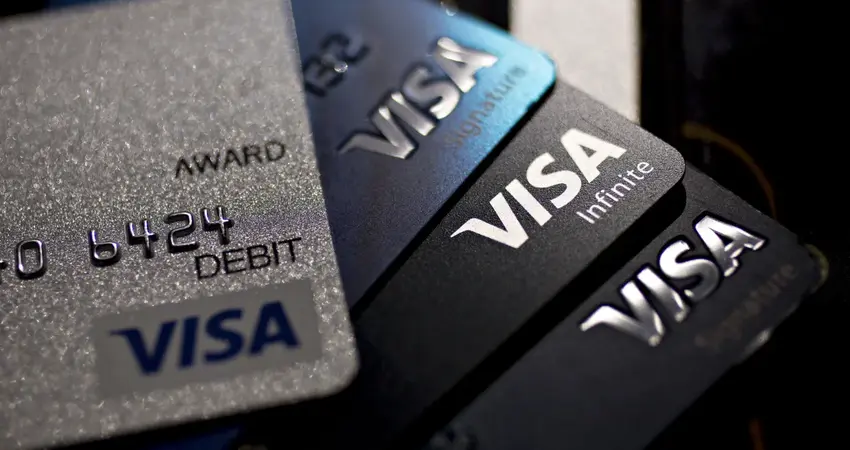The Justice Department said the financial company, which processes most debit card transactions in the United States, unfairly imposed fees on merchants and competitors.
The Justice Department filed an antitrust lawsuit against Visa on Tuesday, accusing the financial giant of preventing unfair competition in debit cards, the latest in a series of cases aimed at curbing monopolistic behavior by big companies. is
For more than a decade, the government claims in its complaint, Visa has had de facto exclusive agreements with merchants and banks, allowing them to route the bulk of their transactions through Visa’s payment network. Encourage. According to the Justice Department, the company maintained its monopoly in large part by charging or threatening to charge higher fees to merchants who use other payment networks to process debit transactions.
The case stems from an extensive investigation spanning years. It’s part of a series of efforts by enforcers under the Biden administration to target corporate middlemen, who it says raise unnecessary fees, and companies that spread the technology to agriculture. Gaining power through President Biden issued an executive order in 2021 that made aggressive antitrust enforcement a pillar of his economic policy.
Visa is a huge middleman: It processed $3.8 trillion in U.S. debit transactions in the year through June, generating more than $7 billion in processing fees each year, the Justice Department said. They account for more than 60 percent of all these transactions.
Attorney General Merrick B. Garland said in a statement accompanying the complaint, “Illegal visa practices affect the value of not just one commodity, but the value of almost everything.
Benjamin Mazer, the third-ranking official at the Justice Department, said at a press conference that visa fees, which are largely hidden from the public, are paid by merchants and can be passed on to consumers, allowing minors And low-income Americans suffer the most. Tuesday.
Julie Rotenberg, Visa’s general counsel, said in the statement: “Today’s lawsuit ignores the fact that Visa is just one of many competitors in the debit space, which is growing with entrants. is.”

“This lawsuit is without merit, and we will vigorously defend ourselves,” Ms. Rotenberg added.
The antitrust violations outlined in the government’s complaint include all debit transactions using a physical card, as well as online or app-based purchases. The Justice Department said that suppressing alternative card networks, which connect a cardholder’s bank to a buyer’s bank, has reduced market competition and “slowed the pace of innovation in the debit payments ecosystem, ” said the Department of Justice.
The government also claims that Visa has prevented other companies such as PayPal and Square from entering the debit card market. Visa has paid financial technology companies to become partners, rather than turning into competitors, it said, citing internal Visa documents.
“Visa abuses its monopoly power to undercut existing debit competitors and buys out its competitors at the expense of consumers, merchants, banks and the competitive process itself,” said Duha Mackey, head of the Justice Department’s antitrust division. Principal Deputy Assistant Attorney General, said in a statement.
The Department’s reservations about visas are long-standing. In 2020 its antitrust division filed a lawsuit to block Visa’s $5.3 billion deal to acquire financial technology firm Plaid, arguing that Visa intended to eliminate a new competitor. In the lawsuit, the Justice Department said Visa already “has a dominant market position through its online debit monopoly, and would unlawfully increase that advantage by acquiring Plaid.”
Visa and Plaid abandoned their contract two months later.
Federal antitrust regulators have also scrutinized MasterCard, over allegations that it illegally suppressed competing debit payment networks. Visa and MasterCard together dominate the payments industry and have resisted accusations that they maintain a duopoly. Last year, the Federal Trade Commission reached an agreement with MasterCard that requires the company to share customer account information with competing networks and allow merchants to choose between competing networks.
The Justice Department has not yet decided what it will need from Visa to resolve the case, said a senior Justice Department official, who was not authorized to speak publicly. Analysts at Wells Fargo said they believed the review “will continue for a long time,” adding that “these situations often resolve with manageable mitigation.”
Visa shares fell more than 5 percent on Tuesday, their steepest daily decline this year.
The lawsuit comes amid a broader focus by regulators on the financial industry. This month, the board of the Federal Deposit Insurance Corp. voted to establish stricter guidelines for reviewing bank deals. On the same day, the Justice Department announced it was withdrawing from a framework established in 1995 that guided how it scrutinized deals. The move is likely to tighten scrutiny of banking mergers.
Together, the actions send mixed signals about how officials will handle Capital One’s pending $35.3 billion acquisition of Discover Financial Services, which banking regulators are currently reviewing. On the one hand, they may indicate intense scrutiny of the industry by regulators. On the other hand, the lawsuit against Visa could draw attention to the argument made by Capital One and Discover that the merger would create a stronger competitor to Visa and MasterCard.
The Biden administration recently suffered a setback when a federal judge temporarily blocked an initiative by the Consumer Financial Protection Bureau to cap late fees on credit card payments at $8 per month. Last week, former President Donald J. Trump reignited the debate by proposing a cap on credit card interest rates.
President Biden’s antitrust enforcers have also taken action against companies including Live Nation Entertainment, which owns Ticketmaster, and property management software maker RealPage in a crackdown on corporate middlemen and “wasteful fees.”



